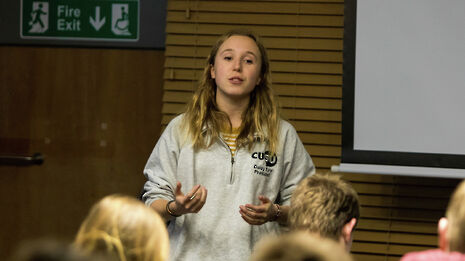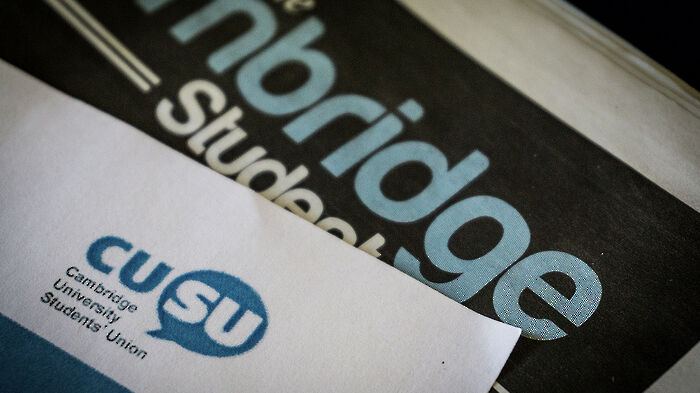CUSU refuses to disclose TCS income figures during Council discussion
President Daisy Eyre said that specific figures would be “quite sensitive”, meaning students are still in the dark about the paper’s finances

CUSU refused to release more detailed information about The Cambridge Student’s finances at CUSU Council on Monday night, just days after publishing a document which claimed that the student union-funded newspaper is facing a “significant loss in revenue” by the end of the year.
The response came in the course of a brief discussion about CUSU’s mid-year budget review, a new initiative aimed to improve transparency ahead of the presentation of the annual budget in Easter Term.
Addressing questions submitted by Varsity, CUSU president Daisy Eyre and student trustee Daniel Dennis said that “availability of precise, current knowledge” pertaining to the paper’s finances “may have an impact on strategies” for income.
After expressing her desire to be “as transparent as possible”, Eyre declined to disclose current figures for the paper’s contract and sponsorship income, saying: “The question was asked by a direct competitor, therefore is quite sensitive”.
In a briefing document released on Friday, CUSU said a “significant loss in revenue from TCS expected for the end of the year,” following a decline in print revenue.
The paper’s board of directors rebutted CUSU’s claims on Saturday, saying the student union’s portrayal of TCS’s finances had “regrettable inaccuracies”. Eyre later said she had contacted TCS’s directors, and told them the briefing had been “accurate”.
Eyre said that TCS’s directors are aware of its sponsorship and contract income – likely to primarily come from web and print advertising – for the year to date.
TCS’s print edition was threatened with abolition in 2016, after CUSU passed a budget which include significant cuts to its funding. After reaching an agreement with Amatey Doku, the former president, student volunteers agreed to produce a fortnightly edition of the paper.
The student union has made wide-ranging cuts to its activities as a result of ongoing financial issues, which have also included lowering budgets to Liberation Campaigns, student elections, and personal spending allowances for sabbatical officers.
TCS, which has a spending budget of £7,000 for this year, remains a potential target for future cuts. Asked how relations between the paper and CUSU stood following their tense exchange at the weekend, Eyre said they were “hopefully good”.
Eyre said that she wished to clear up “inaccuracies”, stressing that the paper had not overspent its budget – something which had not been said in CUSU’s briefing or either group’s statements.
Speaking after Council, TCS’s board of directors, a group of students who oversee the paper’s activities, told Varsity in a statement: “We appreciate Daisy acknowledging that the wording of the statement was misleading, and that she clarified this at CUSU Council. We would like to reiterate that the fiscal responsibility of TCS lies with the CUSU Finance Team, and not with the Board or Editors. Our financial situation is reliant on advertising revenue brought in by the CUSU team, and we always encourage their efforts.”
CUSU has already lost hundreds of thousands of pounds as a result of a collapsed publishing contract, and the end of its nightlife activities. At Council, Eyre said expected losses for this year would be slightly lower than previously anticipated: £70,000 instead of £75,000.
After answering questions submitted in advance, Dennis and Eyre took a limited number of questions about the budget.
Dennis, who sits on the committee which oversees TCS’s finances, said he would be in favour of releasing full figures for the paper’s income at the end of the academic year, when Council presents its next budget, but said that releasing information in the middle of the financial year could impact its ability to make money in the future.
“Availability of knowledge of precise, current knowledge of paper may have an impact on strategies,” he said. “It’s not to hide figures for any other reason than to provide the best possible revenue streams for TCS.”
Dennis said that CUSU’s income generation team were currently dedicating 10% of their operating time to securing income for the paper.
After acting chair Mark McCormack – CUSU’s general manager – said that further questions should be submitted via email, activist student and NUS delegate Angus Satow commented that the budget review did not “seem like much of a discussion”.
“It’s not supposed to be, it’s supposed to be informative,” Eyre responded
 News / Colleges charge different rents for the same Castle Street accommodation2 March 2026
News / Colleges charge different rents for the same Castle Street accommodation2 March 2026 News / News in Brief: waterworks, wine woes, and workplace wins 1 March 2026
News / News in Brief: waterworks, wine woes, and workplace wins 1 March 2026 News / Climate activists protest for ‘ethical careers policy’1 March 2026
News / Climate activists protest for ‘ethical careers policy’1 March 2026 News / Angela Merkel among Cambridge honorary degree nominees27 February 2026
News / Angela Merkel among Cambridge honorary degree nominees27 February 2026 News / Private school teacher who lied about Cambridge degree barred from teaching27 February 2026
News / Private school teacher who lied about Cambridge degree barred from teaching27 February 2026










